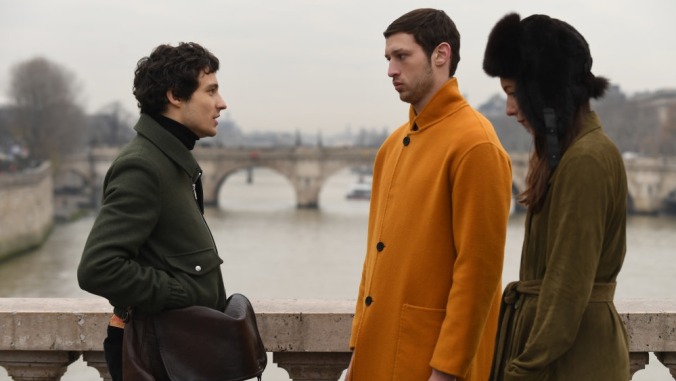Berlin winner Synonyms is a stylish but obvious fish-out-of-water allegory

Yoav (Tom Mercier), the hero of the Israeli writer-director Nadav Lapid’s quizzical new film Synonyms, is not the first person to come to Paris in search of rebirth only to find disappointment. But there he is, on his first night in the city, in an unheated and unfurnished apartment on the Left Bank, minding his own business, cranking one off in the bathtub, when someone sneaks in and steals his backpack, his sleeping bag, and his clothes. (The circumstances of the theft are as mysterious as those of Yoav’s arrival.) Naked, he runs up and down the grandiose staircase of the building, banging on the doors for help, but no one answers. So he goes back to the apartment, climbs into the tub, and passes out in the cold water.
The neighbors, Emile (Quentin Dolmaire) and Caroline (Louise Chevillotte), find Yoav the next morning and carry him back to their apartment in a pose that mimics that of Christ in the Pietà. Emile lends Yoav some clothes (which fit miraculously, despite a substantial difference in height and build), including a ridiculous yellow overcoat. Emile can barely hide his infatuation with the peculiar and strapping foreigner, who has come to France with no intention of returning to Israel, and refuses to speak any language except French (which he is learning with the help of a dictionary), even around his fellow Israelis. But Emile and Caroline are wannabes, too. They are rich kids living as artists: she as a part-time classical musician, and he as an aspiring novelist, struggling to finish a turgid manuscript called Nights Of Inertia.
By Lapid’s account, Synonyms is loosely autobiographical, inspired by his own experiences as an aspiring expat in the early 2000s. But no one would mistake its style and symbolically loaded fairytale logic for realism. Lapid, a blatantly allegorical filmmaker, sketches out Yoav’s misadventures in a strange new country in skits and slapstick. Early on, he gets a job as a security company that is mostly staffed by Israelis, and is befriended by a couple of burly Jews who come across as parodies of Jewish and specifically Israeli machismo (also a focus of Lapid’s more po-faced debut, Policeman): Michel (Olivier Loustau), who organizes a semiannual battle royale in which Jews and Neo-Nazis get to fight under the ancient laws of hand-to-hand combat, and Yaron (Uria Hayik), who gets off on coming up to complete strangers and telling them that he’s from Israel. Later, Yoav finds employment as a nude model for a photographer (Stranger By The Lake’s Christophe Paou) who tries to get him to pose in a sleazy photo shoot themed around the Israeli-Palestinian conflict. For all of its conspicuous irritation with national identity, Synonyms is no less discomfited by the official French values of liberté, égalité, and fraternité, which are represented by a mandatory “integration course” in which the instructor (Léa Drucker) dutifully informs her class of new immigrants that there is no God.
Yet as a director, Lapid remains a Francophile. Policeman’s portrayal of a cell of aspiring left-wing terrorists borrowed liberally from the 1960s films of Jean-Luc Godard. The influence is even more pronounced in Synonyms, which finds equal inspiration in New Wave imagery (complete with the requisite love triangle) and in Godard’s early flair for mischievous cinematic misrepresentation. Though Yoav appears to have been both traumatized and disillusioned by his time as a machine gunner in the IDF, his flashbacks are surreal; there is no reality here beyond the one that can only exist in movies. Which is not to say that Lapid’s droll comedy doesn’t reflect real-world concerns. Above all, it’s about the impossible desire, shared by both expats and artists, to forge an identity of one’s own. But whereas the films it quotes sought to create cryptic and contrapuntal meanings, Lapid errs on the side of the loudly obvious, building to a final shot that might as well be a thesis statement for the rest of the film.